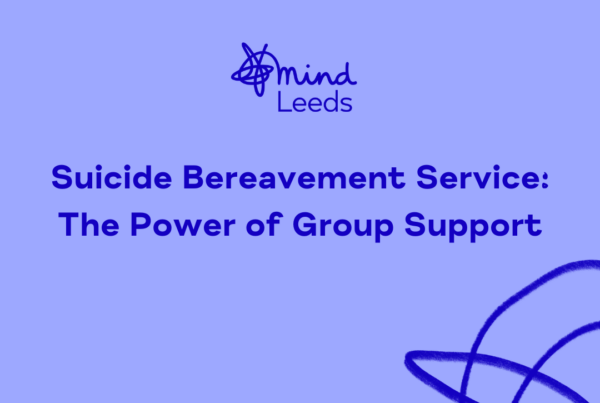Parenting is demanding even on the best of days. When you’re grieving the loss of someone to suicide, those everyday challenges can feel overwhelming and emotionally exhausting. Whether the person you lost was a partner, child, friend, sibling, or someone else close to you, the impact of grief can ripple through every part of life – including how you continue to show up as a parent.
At Leeds Mind’s Suicide Bereavement Services, our practitioners and the people who use our services have shared insights and practical advice to help parents navigate this incredibly difficult time. This blog offers guidance, reassurance, and resources to support you and your family.
Remember that grief affects the whole family
Grief doesn’t just affect us – it affects our children too. Even if they weren’t directly connected to the person who died, they will feel the emotional shifts in the household. Children are perceptive and often pick up on our distress, even when we try to hide it.
Grief can manifest in many ways: physical symptoms like headaches and fatigue, emotional changes such as irritability or sadness, and a lowered ability to cope with stress. These reactions are normal, but they can make parenting feel even harder, especially when you and others around you are experiencing them together.
Finding ways to support your child’s grief (or reaction to the loss) can help ease some of this pressure.
Every child grieves differently. Some may ask questions, others may withdraw. Some may seem unaffected at first, only to revisit their grief months or years later – especially if they were young when the loss occurred.
A practitioner from Leeds Mind (who has dealt with a significant loss whilst parenting) shared this advice:
“Each child is different and how they manage their grief is different; and that’s ok. Grief presents differently in everyone. As parents, we want to do everything and anything to support them. Finding age-appropriate and honest ways to talk to your child about the loss is significant. Children can often sense when something is going on so ensuring information is given from parents (and not second-hand sources) is important in allowing your child to process what has happened.”
Maintain routine (when you can)
Children and young people thrive on routine – it offers a sense of safety and predictability. While it may feel impossible to maintain structure during grief, small efforts can make a big difference. Try to keep up with:
- School attendance
- Bedtime routines
- Shared mealtimes or activities
That said, it’s okay if things slip. Accepting help from family, friends or support services can ease the burden. Whether it’s someone cooking a meal, helping with childcare, or simply being there to listen – leaning on others is a strength, not a weakness.
Remind yourself that self-care isn’t selfish
As parents, we often put ourselves last. But during grief, self-care becomes even more essential. Taking care of yourself helps you better support your children and model healthy coping strategies.
Self-care doesn’t have to be anything huge. It could be:
- Going for a walk
- Journaling your thoughts
- Taking a quiet moment with a cup of tea
- Speaking openly about your emotions
Being honest with your children about how you’re feeling shows them that it’s okay to express emotions and seek support. You’re teaching them resilience through your own vulnerability.
Finding small moments of comfort
Dr. Mekel S. Harris, a specialist in coping and adjustment to acute and chronic illness, grief and loss, and health-related trauma, reminds us:
“Parenting is a job where we are expected to show up and make quality decisions and be emotionally available for our children – have a physical presence in their lives. Grief makes it difficult to do those things.”
Even in grief, moments of joy can exist. A shared laugh, a walk in nature, a cuddle on the sofa – these small moments can be healing. They don’t erase the pain, but they can still bring comfort.
Where to find support
You don’t have to do this alone. There are services and organisations that can support you and your family.
Schools are a good point of call and generally supportive in adhering to your children’s needs at school and ensuring they have adults/teachers they can speak to if they are finding things difficult.
Workplaces can also offer support during a bereavement. It’s important you are open and honest with your employer about your needs. This can include things like phased return and reduced hours after a bereavement to help us manage with the transition back to work.
GPs and mental health services are also available, and can often signpost to further, specific support.
Here’s some key organisations and resources:
- Leeds Mind – We offer compassionate support for people bereaved or affected by suicide, including children and families
- MindWell – Information on normal reactions to bereavement
- Winston’s Wish – Resources for children and teens, and guidance for parents
- Cruse Bereavement Support – National support for anyone grieving
- Night OWLS (MindMate) – Confidential support line for children, young people, and parents/carers in West Yorkshire (8pm–8am)
Final thoughts
If you’re in the thick of grief, it may feel like nothing will ever be okay again. But one parent shared this reflection:
“If I could have told myself one thing when I was in the thick of my grief, I would have reassured myself that things would be okay, and that loss doesn’t need to negatively affect every part of my kids’ lives – and won’t.”
Grief is a journey, not a destination. Be gentle with yourself, especially when you’re continuing to show up as a parent. You’re doing the best you can – and that’s enough.
If you think you’d benefit from support from our Suicide Bereavement Services, you can learn more and refer yourself on our website.



